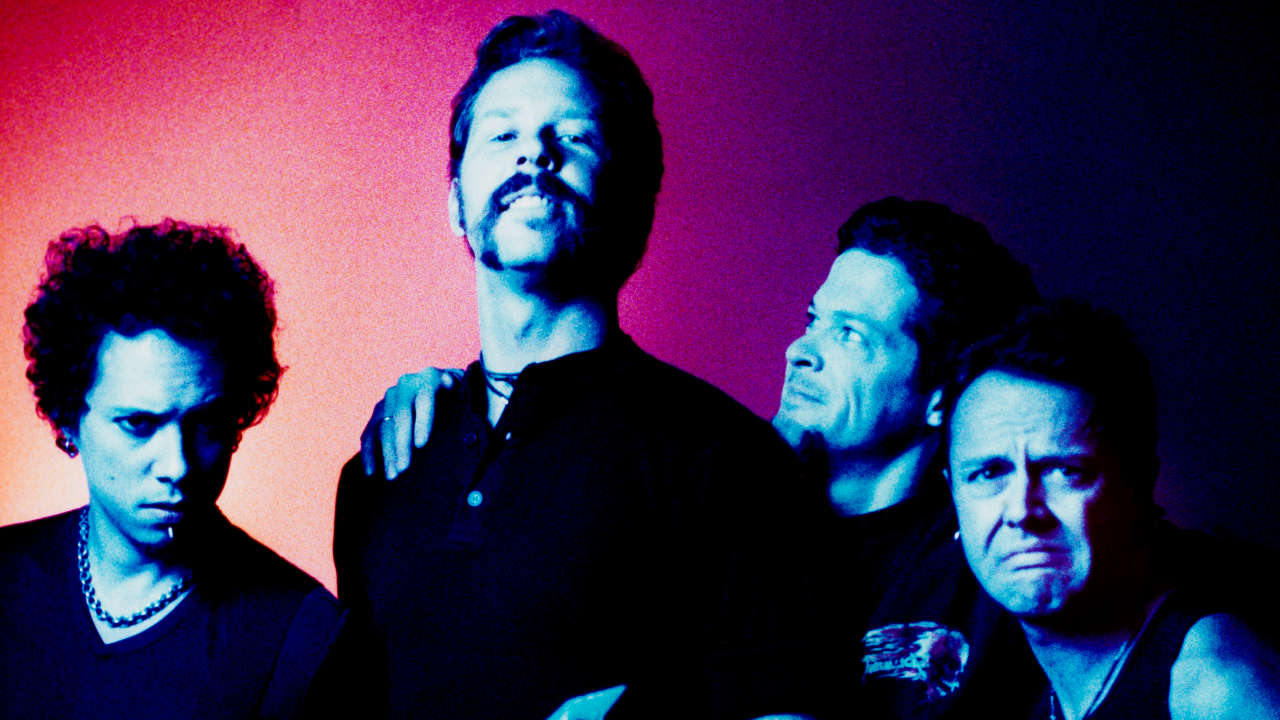
“Metallica sold out!” It’s a complaint that elitists love to mash into comment sections and scream at anyone who’ll pay attention. Yet, for all the people desperate to bring heavy metal’s biggest stars down a peg, there’s little consensus on when this band actually (allegedly) traded their morals for big bucks.
Some say Metallica sold out when they went art rock with Load. Others argue it was with the first pluck of an acoustic guitar string on Ride The Lightning. The particularly pearl-clutching like to go back even further still. So, here’s the quintessential timeline of every moment where the Four Horsemen attacked metal tradition and overcame the backlash on their crusade towards the top.

1981: “Play music get rich”
Did Metallica sell out before they even started? According to a handful of people… yes. Pictures of singer/guitarist James Hetfield’s high school photo have occasionally done the rounds on the internet, with the quote underneath detailing his career aspirations: “Play music get rich.”
Hetfield biography So Let It Be Written says that the line’s genuine, which is enough for some to argue that Metallica were never about the music to begin with. For the rest of our lives, we should all be held to what we said and wrote at 18, shouldn’t we?
1983: Firing Dave Mustaine
Metallica fired lead guitarist Dave Mustaine over personal conflicts in 1983. Although the band hadn’t even recorded debut album Kill ’Em All when this happened, apparently it constituted selling out.
“Metallica ‘sold out’ when they dumped Mustaine,” some fella on Quora’s written under the question “Did Metallica ‘sell out’ during their Black Album period?” (we’ll get to that). “They traded the punk fire of Mustaine and the very core of thrash music […] for a much easier-to-swallow guitar-player-for-hire in [Kirk] Hammett for the sake of band longevity.”
That’s us told.

1984: Using acoustic guitars on Fade To Black
Metallica were never just a thrash band (Anesthesia – Pulling Teeth, anyone?), but second album Ride The Lightning is when they really started to transcend the boundaries of the subgenre. Fourth track Fade To Black was an evocative ballad that used acoustic guitars and ruffled the feathers of battle-jacketed diehards.
“When the ‘metal’ community heard a Metallica song with acoustic guitars, they lost their fucking lunches,” Lars Ulrich told Howard Stern in 2013.
Of course, now the song is a fan favourite and live mainstay.
1984: Escape
Another Ride… cut – the poppier, streamlined Escape – has also been on the receiving end of “sell-out” accusations. However, apparently those jabs came from within the band itself this time around.
“They kind of felt that they were maybe selling out a bit,” Ride… producer Flemming Rasmussen told Rock Talk in 2018. “But they were on that Megaforce label and they desperately wanted to go on a major label. So it was kind of their way of pleasing a major label without knowing what they really wanted.”
1986: Signing to a major label for Master Of Puppets
In 1986, Metallica graduated from underground label Megaforce to the more formidable Elektra: former home of The Doors and The Stooges. The sell-out remarks unsurprisingly followed them during this jump, which a journalist quizzed Hetfield and then-bassist Cliff Burton about the same year.
“A lot of people think you’ve sold out just because you’re on a major label and very popular,” James said.
“Or maybe you don’t play 1,000mph the whole time!” Cliff added.
“We’d be doing the same thing if we were still on an independent label,” finished James.
1989: Making a music video
Metallica released their first music video, a harrowing clip for …And Justice For All single One, in 1989 and received some long-elusive goodwill from MTV. As James Hetfield revealed in 2018, though, that acceptance came at a cost: one particularly insulted ‘fan’ spat on him at a concert.
“He said, ‘You sold out! You made a video!’” Papa Het reflected. “Right there, I went, ‘Yes we did. Fuck you!’ That’s when I started to realise, ‘OK, you can stay small and in this thing but, if you have something to say that’s really important, you need to utilise these things, whether it’s video, the internet or movies.’”
1990: Hiring Bob Rock
After Justice… saw Metallica go wildly technical, the Four Horsemen wanted to be as simple as possible for its follow-up. The band hired former The Cult and Mötley Crüe producer Bob Rock to twiddle the dials on The Black Album, and – surprise, surprise – elitists weren’t happy.
“He came from ‘the other side’,” Kirk Hammett told The Guardian in 2021. “He was working for bands that were really radio-oriented, like Bon Jovi, Mötley Crüe, Loverboy and Aerosmith. We were that heavy metal band that just wanted to be a heavy metal band.”
1991: Enter Sandman, Nothing Else Matters, The Black Album and chart success make purists go apeshit
When Enter Sandman and Nothing Else Matters became megahits and The Black Album topped charts worldwide – all while flaunting a simpler, more anthemic style – fans pissed off by Bob Rock coming onboard only grew louder. 1991 is still regarded by many as the year Metallica ditched their credibility for good, despite the band still being a very heavy metal force.
“Sure enough, accusations that they had sold out came from the rump of hardcore fans within seconds of their fifth album being released in 1991,” journalist Sid Smith wrote for the BBC in a 2007 review.
1996: Getting haircuts, going art rock
If elitists weren’t annoyed in 1991, then they certainly were five years later. Metallica returned from The Black Album with short hair and a new avant-rock sound on Load, and many weren’t having it. Of course, no one who was actually selling out would write ten-minute giants like The Outlaw Torn, but the allegations still flew thick and fast.
“Yes, we sell out,” then-bassist Jason Newsted responded in a 1998 Behind The Music episode. “We sell out every seat in the house, every time we play.”
2000: Suing Napster
In a PR move as effective as slapping an orphan, Metallica sued file-sharing site Napster in 2000 and became public enemies number one to four. Some people are still pissed about it, seeing it as blatant money-grabbing when, in reality, the band basically foresaw the music landscape we have today, where underground artists get paid next to nothing for their music.
“We were the bad guys, we were these greedy rock stars,” Lars Ulrich said on VH1’s When Metallica Ruled The World documentary in 2005.
2022: Master Of Puppets rocks up in Stranger Things
Metallica found renewed relevance when Stranger Things used Master Of Puppets during a climactic scene with show-stealer Eddie Munson. The song returned to the charts and ruled Tiktok for a bit, and some lamented the new, “false” fanbase that came with the attention.
“I’m sorry Metallica for all the fake Stranger Things fans,” one TikTok user commented. The band’s account had the classiest response: “Don’t be sorry. Everyone is welcome in the Metallica Family. If they like Puppets, chances are they’ll find plenty of other songs to get into.”







